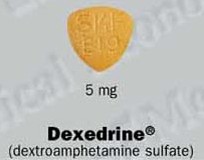

| |
|
|
|
|
Dexedrine Side Effects
from the Physicians' Desk Reference®Pronounced: DEX-eh-dreen
Generic name: Dextroamphetamine sulfate
Dexedrine is a single entity amphetamine
product combining the neutral salts of dextroamphetamine and amphetamine,
with the dextro isomer of amphetamine saccharate and d, I-amphetamine
asperate. Amphetamines can be habit-forming, and prolonged use may
increase the risk of dependency.
Why is this drug prescribed?
Dexedrine, a stimulant drug available in tablet or sustained-release
capsule form, is prescribed to help treat the following conditions:
- Narcolepsy (recurrent "sleep attacks")
- Attention Deficit Hyperactivity Disorder. (The total treatment program should include social, psychological, and educational guidance along with Dexedrine.)
Most important fact about this drug
Because it is a stimulant, this drug has high abuse potential. The stimulant effect may give way to a letdown period of depression and fatigue. Although the letdown can be relieved by taking another dose, this soon becomes a vicious circle.
If you habitually take Dexedrine in doses higher than recommended, or if you take it over a long period of time, you may eventually become dependent on the drug and suffer from withdrawal symptoms when it is unavailable.
Precautions:
- This medicine may be habit-forming with long-term use.
- Check medicines with healthcare provider. Monoamine oxidase inhibitors (eg, isocarboxazid, phenelzine, or tranylcypromine) must be stopped 14 days before this medicine is started. The two together could cause dangerously high blood pressure.
- You may not be alert. Avoid driving, doing other tasks or activities until you see how this medicine affects you.
- Limit caffeine (for example, tea, coffee, cola) and chocolate intake. Use with this medicine may cause nervousness, shakiness, rapid heartbeats, and anxiety.
- Use caution if you have high blood pressure. Talk with healthcare provider.
- Do not use over-the-counter products that increase blood pressure. These include cough or cold remedies, diet pills, stimulants, ibuprofen or like products, and certain herbs or supplements. Talk with healthcare provider.
- Tell healthcare provider if you are allergic to any medicine. Make sure to tell about the allergy and how it affected you. This includes telling about rash; hives; itching; shortness of breath; wheezing; cough; swelling of face, lips, tongue, throat; or any other symptoms involved.
- Tell healthcare provider if you are pregnant or plan on getting pregnant.
- Do not use if you are breast-feeding.
Side effects and warnings:
Serious - Irregular heartbeat, chest pain, increased blood pressure, skin rash, uncontrollable movements of arms and legs, mental changes, unusual weakness, very high fever. Call your doctor immediately.
Common - Mood changes, insomnia, drowsiness, restlessness.
Less Common - Blurred vision, constipation, diarrhea, loss of appetite, headache, increased sweating, stomach cramps or pain, nausea or vomiting, changes in sexual desire or decreased sexual ability.
Effects of chronic heavy abuse of Dexedrine may include:
Hyperactivity, irritability, personality changes, schizophrenia-like thoughts and behavior, severe insomnia, severe skin disease.
Why should this drug not be prescribed?
Do not take Dexedrine if you are sensitive to or have ever had an allergic reaction to it. Do not take Dexedrine for at least 14 days after taking a monoamine oxidase inhibitor (MAO inhibitor) such as the antidepressants Nardil and Parnate. Dexedrine and MAO inhibitors may interact to cause a sharp, potentially life-threatening rise in blood pressure.
Your doctor will not prescribe Dexedrine for you if you suffer from any
of the following conditions:
Agitation
Cardiovascular disease
Glaucoma
Hardening of the arteries
High blood pressure
Overactive thyroid gland
Substance abuse
Special warning about this medication:
Be aware that one of the inactive ingredients in Dexedrine is a yellow food coloring called tartrazine (Yellow No. 5). In a few people, particularly those who are allergic to aspirin, tartrazine can cause a severe allergic reaction.
Dexedrine may impair judgment or coordination. Do not drive or operate dangerous machinery until you know how you react to the medication.
There is some concern that Dexedrine may stunt a child's growth. For the sake of safety, any child who takes Dexedrine should have his or her growth monitored.
Reasons to call healthcare provider immediately
Signs of a life-threatening reaction. These include wheezing; tightness in the chest; fever; itching; bad cough; blue skin color; fits; swelling of face, lips, tongue, or throat.
Very nervous and excitable.
Severe headache.
Chest pain, pressure, or fast heartbeats.
Any rash.
No improvement in condition or feeling worse.
How the Dexedrine Functions - Hundreds of animal studies and human clinical trials leave no doubt about how the medications work. First, the drug suppresses all spontaneous behavior. In healthy chimpanzees and other animals, this can be measured with precision as a reduction in all spontaneous or self-generated activities. In animals and in humans, this is manifested in a reduction in the following behaviors: (1) exploration and curiosity; (2) socializing, and (3) playing. Second, the drug increases obsessive-compulsive behaviors, including very limited, overly focused activities.
| |
|
Dexedrine was often used in the late 60s and early 70s as a prescription diet aid, because one of the effects of such stimulant drugs is to suppress appetite. Dexedrine and its more potent cousin Benzedrine, were also commonly (and illegally) used by college students, either for the stimulant high it provided or as a study aid to stay awake.
|
This website is operated by Ablechild.org (Parents for Label and Drug Free Education). The intent of this site is to educate and inform the public on the issues surrounding ADD/ADHD, the testing, and the drugs involved. Since there is no medical proof of any ADD or ADHD "disorder", we ask that you do not use this site for medical reasons. For real medical solutions please contact your doctor - for real educational solutions contact your school.

